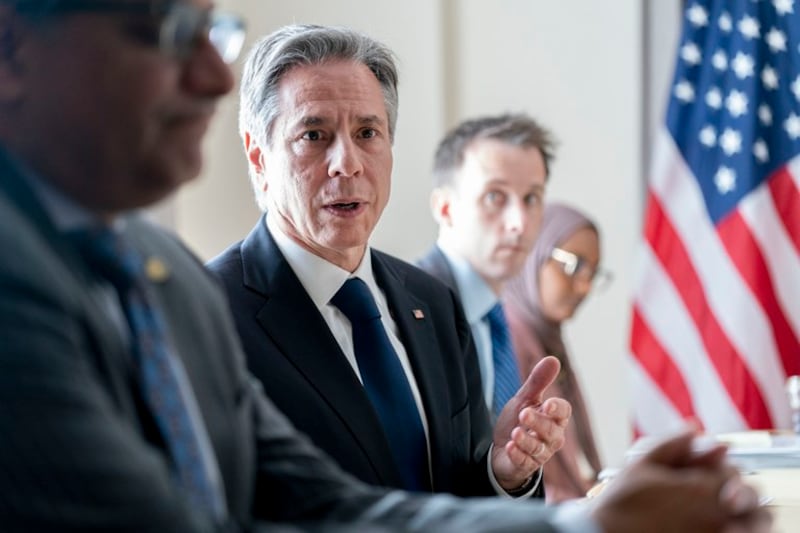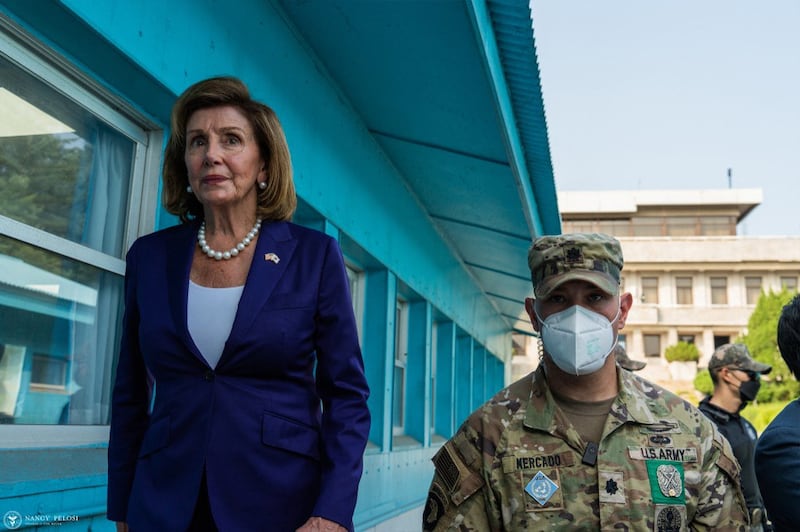UPDATED at 7:00 p.m. EDT on 2022-08-04
Southeast Asian nations called for “maximum restraint” as China launched ballistic missiles into the waters around Taiwan on Thursday, while Western nations urged Beijing not to escalate tensions further after U.S. House Speaker Nancy Pelosi visited the island.
Chinese Foreign Minister Wang Yi – who was in Cambodia’s capital for meetings with counterparts from ASEAN states and other nations – called the unprecedented live-fire drills “reasonable and legitimate steps to safeguard its sovereignty and territorial integrity,” as China kept venting its fury over Pelosi’s stop in Taipei.
More than 100 aircraft and more than 10 warships took part on Thursday in the first day of live-fire exercises that will go until Sunday, Chinese state media reported. China began the exercises a day after Pelosi left Taiwan after becoming the highest ranking American official to visit the island in 25 years.
The Taiwan Defense Ministry responded by scrambling jets to warn away 22 Chinese aircraft that crossed into its air defense zone and also fired flares to drive away four drones involved in the exercises, according to Reuters.
The Association of Southeast Asian Nations, whose foreign ministers are meeting in Phnom Penh this week along with the top diplomats from China, the United States and other powers, came out with a rare collective statement expressing worry about the tensions in the Taiwan Strait.
Without naming China or the U.S., they said ASEAN was concerned about volatility that “could destabilize the region and eventually could lead to miscalculation, serious confrontation, open conflicts and unpredictable consequences among major powers.”
“ASEAN calls for maximum restraint” and for the powers to “refrain from provocative action,” according to excerpts from their statement.
“We should act together and ASEAN stands ready to play a constructive role in facilitating peaceful dialogue between all parties including through utilizing ASEAN-led mechanisms to de-escalate tension, to safeguard peace, security and development in our region,” the Southeast Asian foreign ministers said.
U.S. Secretary of State Antony Blinken, who was in Phnom Penh on Thursday, said he did not want China to manufacture a crisis to increase military activity in the region and that the United States opposed “any unilateral efforts to change the status quo” on Taiwan.
Retno Marsudi, the foreign minister of ASEAN member Indonesia, said her nation was “worried about the increasing rivalry between the big powers.”
“And if this rivalry is not managed properly, it will lead to an open conflict that will surely threaten peace and stability, including in the Taiwan Strait,” she warned.
In Manila, the Philippine Department of Foreign Affairs joined the chorus of regional concern about tensions around Taiwan.
“Diplomacy and dialogue must prevail,” it said.

Cambodia, this year’s ASEAN chair, issued its own statement where it too announced that it “consistently and firmly adheres” to the One China Policy, under which Beijing is recognized as the sole government of China.
The United States also holds this policy, but maintains close unofficial ties with Taiwan and is obligated by law to provide defense support. Washington only acknowledges China’s sovereignty claim over Taiwan rather than endorsing it.
For its part, Cambodia said it considered issues related to Taiwan along with Hong Kong, Tibet and Xinjiang as being “under the sovereign rights of the People’s Republic of China.”
Wang: Pelosi ‘irresponsible’
Wang, meanwhile, took a hardline stance on what he saw as efforts against Beijing. He lashed out at Pelosi for visiting Taiwan, saying it was a “manic, irresponsible and highly irrational” act, CCTV, the Chinese state broadcaster, reported.
China’s foreign minister also rejected a statement from leaders of the Group of Seven (G7) nations on Wednesday, where they expressed concern about the proposed live-fire exercises.
“There is no justification to use a visit as pretext for aggressive military activity in the Taiwan Strait. It is normal and routine for legislators from our countries to travel internationally. The PRC’s escalatory response risks increasing tensions and destabilizing the region,” the G7 said.
Wang accused the G7 – which includes the United States and Japan – of ignoring the negative effects of Pelosi’s visit.
“It groundlessly criticizes China for taking such measures, which are reasonable and legitimate steps to safeguard its sovereignty and territorial integrity,” China’s foreign ministry quoted Wang as saying in response to the G7.
Wang also challenged the U.S. to get on board with Beijing’s plan.
“The United States should not dream of obstructing China’s reunification. Taiwan is a part of China. The complete reunification of China is the trend of the times and an inevitability of history,” he said.

On Thursday, Washington’s top diplomat reiterated the American government’s support for Taiwan while remaining committed to the One China policy.
“The United States continues to have an abiding interest in peace and stability across the Taiwan Strait,” Antony Blinken said in an opening statement at the ASEAN meeting where Retno Marsudi joined him.
“We oppose any unilateral efforts to change the status quo, especially by force,” he said. “And I want to emphasize [that] nothing has changed about our position.”
He also said that he did not want China to “manufacture a crisis or seek a pretext to increase its aggressive military activity,” according to a transcript from his joint press conference with Retno.
“We, and countries around the world believe that escalation serves no one and could have unintended consequences that serve no one’s interest including ASEAN members and including China.”
Blinken said U.S. officials had reached out to their Chinese counterparts over the last several days to convey this message.
“Maintaining cross-strait stability is in the interests of all countries in the region, including all of our colleagues within ASEAN,” he said.

Pelosi’s Taiwan visit reverberated far beyond ASEAN to South Korea, a U.S. ally that tries to balance security ties with Washington with key economic links with China.
South Korean President Yoon Suk Yeol chose not to interrupt his vacation to meet Pelosi in person – and the two spoke by phone instead.
“President Yoon’s vacation schedule and Speaker Pelosi’s visit to the Republic of Korea overlapped, and we did not rearrange our schedule,” said his office in a statement.
Some South Korean analysts said Yoon, whose country is a long-time U.S. ally, had blundered by becoming the only leader not to meet Pelosi. Her four-nation Asia trip began in Singapore and Malaysia before the Taiwan stopover, and will end in Japan.
“It gives a bad sign that South Korea is a very weak link (among the U.S. allies)," said Cha Du Hyeogn of the Seoul-based Asan Institute.
“What would China think later? Who will be the primary target when it’s confronting each country in the Indo-Pacific region?” said Cha, reflecting criticism in Seoul that Yoon had snubbed Pelosi to avoid Chinese anger over her Taiwan visit.
UPDATED with controversy in South Korea over President Yoon Suk Yeol's failure to meet Pelosi.
RFA Korean in Seoul and Jason Gutierrez in Manila contributed to this report by BenarNews, an RFA-affiliated online news service.
